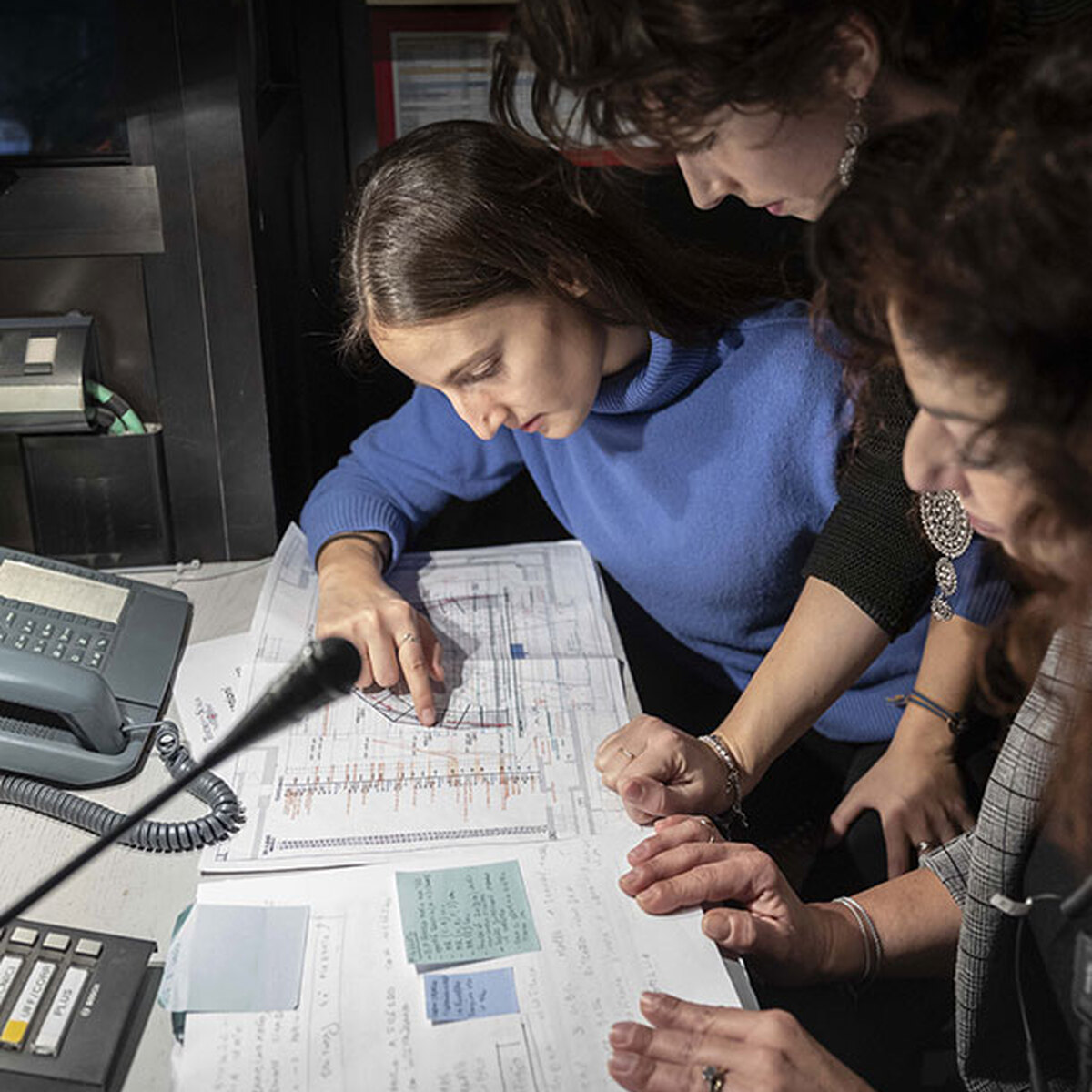CORE SUBJECT
Stage Management Theory and Technique
Stage Directors Luca Bonini, Andrea Boi, Davide Armati Battistelli, Barbara Patruno, Laurent Daniel Gerber, Luisella Caielli, Pietro Paolucci, and Lucio Mazzoli
- Organizational and technical role of the stage director in opera, drama, and concert theatres.
- Regulation of stage activities in indoor and outdoor venues.
- Observation and Direction of rehearsals and performances.
- Music theory, solfège, score preparation.
Field Project
in collaboration with the Piccolo Teatro di Milano
COMPLEMENTARY SUBJECTS
Introduction to the professional figures in the performing arts
Umberto Bellodi, La Scala Academy coordinator
- Professional profiles in the performing arts.
Institutional nature of producers and/ or host organizations
Mariano Festa, Relations, Teatro alla Scala
- Opera and Symphony foundations.
- Policy, institutions, legislation.
Production Organization
Maria De Rosa and Nadia Ferrigno, Teatro alla Scala Department of Production Organization
Michele Sciolla, musical services director, Teatro alla Scala
Andrea Minetto, consultant and project manager
Paolo Belluso, tour manager
- Production organization for opera, festivals, and tours.
- Focus on production organization and planning, Teatro alla Scala.
- Musical services and the role of the assistant conductor/piano accompanist.
Introduction to the role of assistant stage manager
Marco Monzini, collaborating stage manager, Teatro alla Scala
- The role of the assistant stage manager in opera
Elements of stage technique
Oscar Frosio, lighting designer
Andrea Ferrario, sound designer
Giuseppe Tolva, Stagehand Department, Teatro alla Scala
Teatro alla Scala Chief Department
- Theatre lighting
- Sound technology
- Meetings with Teatro alla Scala department heads: makeup, costumes, sound, stagehands, props, footwear
- Stage organization, coexistence during performances
- Specific terminology
PERFORMING ARTS CULTURE
Music history and repertoire analysis
Fabio Sartorelli, musicologist and lecturer
Paolo Piazza, assistant conductor, Teatro alla Scala
- Requisite knowledge of musical repertoire for stage managers
- Music itineraries, aspects of dramaturgy
- History of Italian opera from its origins to the early 20th century
- Analysis and study of selected opera titles
Stagecraft
Ruggero Bellini, Head of Set Design Workshops, Teatro alla Scala
Stefania Cavallin, Assistant to the Technical Director, Teatro alla Scala
- Elements and terminology of stagecraft
- Specific nomenclature
- Two-dimensional technical design, reading and understanding plans and sections
- Special effects in the theatre
- Comprehension and reading of sketches, figurines, and theatre models
- Tours of former Ansaldo workshops, Teatro alla Scala
- From design to execution, from the stage to the performance
History of ballet
Fabio Sartorelli, musicologist and lecturer
Vito Lentini, dance and ballet historian and critic
- Notable La Scala ballets, music, choreographer, performers
- Advanced contemporary repertoire from the 1990s to the present day
History of theatre costumes
Chiara Donato, costumer
- Historical development of theatre costumes
- Stage props and costume shop tools
- Stage organization for costume changes
History of theatre stage set design
Leila Fteita, set designer
Stefania Cavallin, Assistant to the Technical Director, Teatro alla Scala
- History of set design
- The creative process from sketches to construction drawings
- Set designer – stage manager relations during set construction and setup
- Guided tours
CAREER ORIENTATION
Teamwork for teaching
La Scala Academy staff
- How to manage interpersonal dynamics in a learning group.
- How to gauge learning in specific moments in order to assess progress of each individual toward general course objectives.
Career Orientation
Marco Aldo Amoruso, Teatro alla Scala HR Director
La Scala Academy staff
- Presenting oneself professionally
- Characteristics of the job market
- Professional contracts
- Internship orientation
English for the performing arts
Polly James, native speaker and teacher of English
- English for the performing arts
Interpersonal and organizational competencies
Rita Cannata, HR specialist
- Interpersonal communication
- Focus on assertiveness, conflict management and negotiation
Workplace safety
Michela Songini, Health and Safety Director, Teatro alla Scala
Sergio Antonio Tasca, safety trainer
- Information on workplace health and safety
- General and specific training: low risk activities
International focus
Performing arts experts
- Basic knowledge and competencies of a stage manager in the performing arts on the international level.
Meetings with experts
Performing arts professionals
- Stage managers and professional figures with whom he/she interacts.





